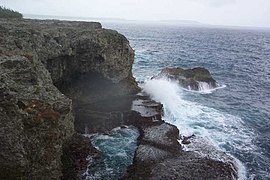Lifou
| Lifou | |
|---|---|

The cliffs of Xodre in Lifou
|
|
 Location of the commune (in red) within New Caledonia |
|
| Coordinates: 20°58′00″S 167°14′00″E / 20.9667°S 167.2333°ECoordinates: 20°58′00″S 167°14′00″E / 20.9667°S 167.2333°E | |
| Country | France |
| Sui generis collectivity | New Caledonia |
| Province |
Loyalty Islands Province (provincial seat) |
| Government | |
| • Mayor | Néko Hnepeune |
| Area1 | 1,207.1 km2 (466.1 sq mi) |
| Population (2014 census)2 | 9,245 |
| • Density | 7.7/km2 (20/sq mi) |
| Ethnic distribution | |
| • 1996 census |
Kanaks 96.9% Europeans 2.6% Polynesians 0.1% Other 0.4% |
| INSEE/Postal code | 98814 / 98820 |
| Elevation | 0–104 m (0–341 ft) (avg. 30 m or 98 ft) |
|
1 New Caledonia Land Register (DITTT) data, which exclude lakes and ponds larger than 1 km² (0.386 sq mi or 247 acres) as well as the estuaries of rivers. 2Population without double counting: residents of multiple communes (e.g., students and military personnel) only counted once. |
|
1 New Caledonia Land Register (DITTT) data, which exclude lakes and ponds larger than 1 km² (0.386 sq mi or 247 acres) as well as the estuaries of rivers.
Lifou [lifu] is a commune of France in the Loyalty Islands Province of New Caledonia in the Pacific Ocean.
Lifou is made up of Lifou Island, the largest and most heavily populated of the Loyalty Islands, its smaller neighbour Tiga Island, and several uninhabited islets in between these two. All these islands lie among the Loyalty Islands, 190 km (120 mi) to the northeast of New Caledonia's mainland. At 1,146 km2 (442 sq mi), Lifou Island is the largest atoll in the world.
The town of Wé, on Lifou Island, is the administrative centre of the commune of Lifou as well as the provincial seat of the Loyalty Islands Province.
Like Maré and Ouvéa, the other Loyalty islands, Lifou is made of fossil coral. Lifou is a makatea (raised coral atoll), an ancient lagoon slowly raised by geological processes. Due to the uplift, Lifou consists of a wide, flat centre surrounded by cliffs which correspond to the ancient reefal cliffs. The coral rock exhibits high porosity and hence, neither Lifou nor any of the other Loyalty Islands have surface water. It does, however, have a large freshwater reservoir which can be accessed through caves. These caves were used in the past when searching for fresh water, and are very important to the island's mythology.
The first Europeans to have contact with Lifouans were whalers, who had very limited, and certainly not friendly, communications with them. Sandalwood traders also came to New Caledonia around 1841.
...
Wikipedia
